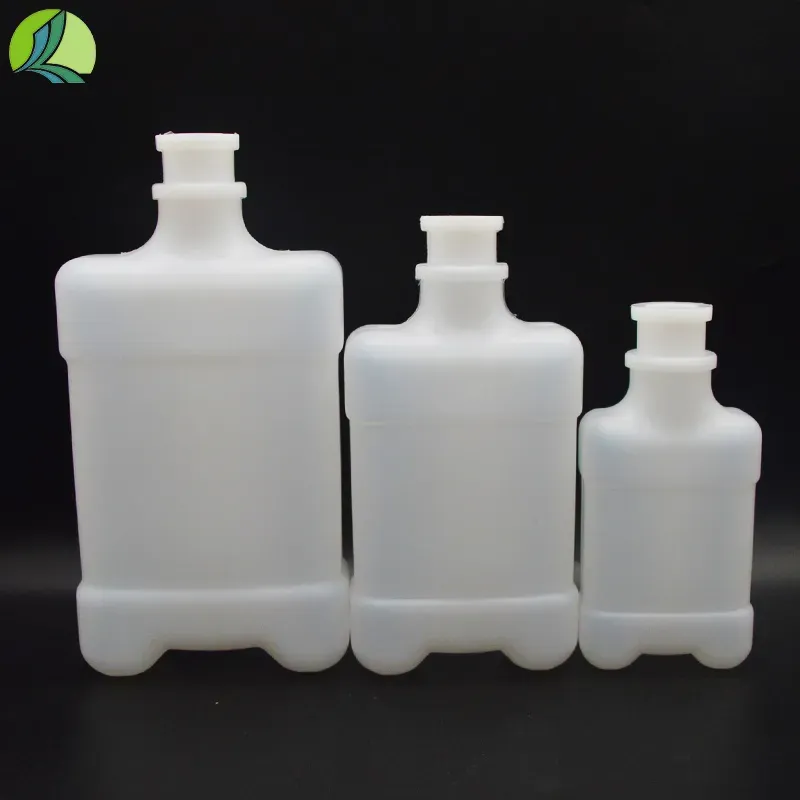https://www.wahmg.com/)">
Suppliers of Reagent Bottles Made from Durable Plastic Material
Suppliers of Reagent Bottles Made from Durable Plastic Material
The Importance of Plastic Reagent Bottles in Modern Laboratories
In contemporary laboratories, the importance of proper storage and handling of chemicals is paramount. One of the most essential components in this regard is the plastic reagent bottle. These bottles are specifically designed to store and transport various reagents safely and efficiently, ensuring that laboratory practices align with safety standards. This article explores the significance of plastic reagent bottles, outlines key suppliers, and discusses considerations when selecting them.
What Are Plastic Reagent Bottles?
Plastic reagent bottles are made from high-quality plastic materials that can withstand a variety of chemical interactions. Commonly, these bottles are crafted from polyethylene or polypropylene, both of which offer durability and resistance to a broad range of solvents, acids, and bases. Unlike glass containers, plastic reagent bottles are less likely to shatter, making them a safer choice for handling hazardous materials in laboratory environments.
Advantages of Plastic Reagent Bottles
1. Lightweight and Portable One of the most significant advantages of plastic over glass is its weight. Plastic bottles are significantly lighter, making them easier to handle and reducing the risk of accidents during transportation.
2. Cost-Effective Plastic bottles are generally more affordable than their glass counterparts. This cost-effectiveness can be crucial for laboratories that frequently use large quantities of reagents, as it allows them to maintain a low overhead while ensuring adequate supplies.
3. Versatile Plastic reagent bottles come in various shapes and sizes to meet the diverse needs of laboratories. Additionally, they are available with a range of closures, spouts, and dispensing options that enhance usability.
4. Reduced Risk of Breakage The inherent resilience of plastic means that these bottles are less likely to break upon impact. This characteristic significantly reduces the risk of injury and chemical spills in laboratories.
Top Suppliers of Plastic Reagent Bottles
There are numerous suppliers in the market specializing in plastic reagent bottles. Some of the notable companies include
1. Thermo Fisher Scientific A global leader in laboratory supplies, Thermo Fisher offers a wide selection of plastic reagent bottles designed for various applications. Their products are known for their quality and reliability.
2. VWR VWR provides a vast array of laboratory products, including high-quality plastic reagent bottles. They cater to both small laboratories and large industrial clients, ensuring that all needs are met.
plastic reagent bottle suppliers

3. Corning Known for its innovative laboratory glassware, Corning also produces a range of plastic products. Their reagent bottles combine advanced manufacturing techniques with superior design, making them a popular choice among professionals.
4. Fisher Scientific Another major player in the laboratory supply market, Fisher Scientific offers an impressive collection of plastic reagent bottles suitable for all types of chemical storage.
5. SIAL For specialized needs, SIAL manufactures plastic reagent bottles designed specifically for the unique requirements of the chemical and pharmaceutical industries.
Considerations When Selecting Plastic Reagent Bottles
When choosing plastic reagent bottles, several factors should be taken into account to ensure compatibility with the stored substances
1. Chemical Compatibility Different plastics react differently to various chemicals. It’s crucial to choose a bottle made from a material that is chemically inert with the reagents it will hold.
2. Temperature Resistance Some experiments may involve extreme temperatures. Ensure that the plastic bottles can withstand the conditions without deforming or releasing harmful substances.
3. Seal Integrity A good seal is vital to prevent contamination and evaporation of reagents. Look for bottles that offer secure, leak-proof closures.
4. Labeling and Identification Clear labeling is important for safety and organization. Opt for bottles designed with convenient labeling surfaces or consider investment in a labeling system.
5. Environmental Impact With growing environmental awareness, consider suppliers that offer eco-friendly options or recycling programs for plastic products.
Conclusion
Plastic reagent bottles play a critical role in laboratory settings, providing a safe and effective means of storing and handling chemicals. With a variety of suppliers available, laboratories have access to a wide range of options tailored to their specific needs. By considering factors such as chemical compatibility, temperature resistance, and sustainability, labs can optimize their chemical storage practices while ensuring safety and compliance with industry standards.
-
Wholesale Plastic Juice Bottles with Caps 16 oz Options Available Bulk Packaging SolutionsNewsJun.10,2025
-
Laboratory Apparatus Reagent Bottle – Durable & Chemical Resistant Bottles for Safe StorageNewsJun.10,2025
-
Squeezable Dropper Bottles Durable, Leak-Proof & CustomizableNewsMay.30,2025
-
Affordable Plastic Petri Plates Sterile & Disposable Lab-GradeNewsMay.30,2025
-
Eye Dropper Caps Precision 24/410 & Plastic Bottle-Compatible TipsNewsMay.30,2025
-
Affordable Mini Spray Bottle Price & Wholesale Deals Shop NowNewsMay.29,2025





















